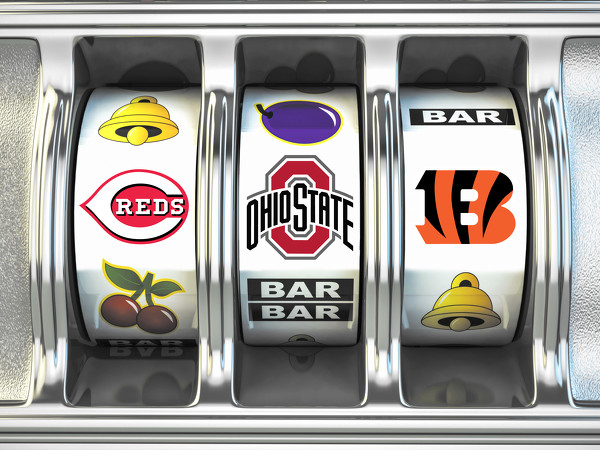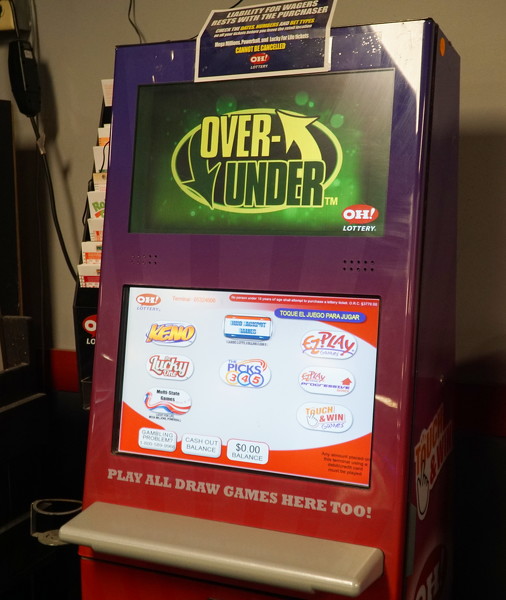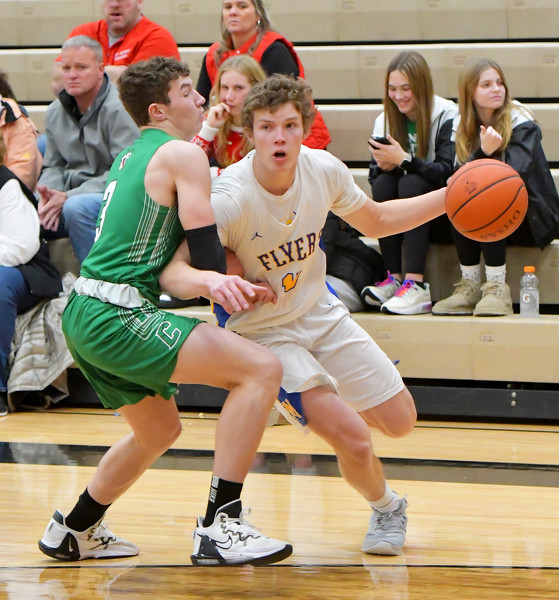
Starting Jan. 1, Ohioans will be able to cast legal bets on pro and college sports online or at licensed venues around the state.
Starting Sunday morning, sports gambling will be legal in Ohio.
House Bill 29, which passed in December 2021, authorized the Casino Control Commission to issue licenses for online sportsbooks, in-person betting at stadiums and casinos and sports betting kiosks in bars, bowling alleys and other businesses. Licensed proprietors can start taking bets on Sunday, though the local kiosks will not be available for a few more weeks.
"There's a lot of people that are very, very excited," said Dianna Cope Steinbrunner, owner of Hole in the Wall in Fort Recovery.
"They're ready," her husband, Dave Steinbrunner, added. "We figure 12:01 (a.m. Jan. 1), they're going to be gambling. We have people that want to be the first one, draw it out first."
Sports gaming kiosks will be available in four locations in Mercer and Auglaize counties: Hole in the Wall, Pla-Mor Lanes in Coldwater, Dutch Mill Cafe in Minster and Speedway Lanes in New Bremen.
Speedway Lanes, Pla-Mor Lanes and the Dutch Mill Cafe will offer sports gaming through the same terminals they use for Ohio Lottery and Keno, operated by Intralot. Hole in the Wall will use a separate kiosk from Gold Rush Gaming.
Intralot's kiosks, according to an Ohio Lottery news release, aren't expected to be ready for sports gambling until mid-January - a reversal from what Pla-Mor Lanes owner Rick Hartings said he was told at an Intralot seminar Dec. 16. Also, Gold Rush's kiosks are now expected in February, according the Ohio Lottery. The Steinbrunners said Gold Rush attributed the delay to supply chain issues.
Kiosks are an "easy path in" to see if sports gambling works for an establishment, said Dan Boarman, a 21 Entertainment sales consultant who has been working with local vendors on distribution for Intralot.

Gambling kiosks at select locations will be updated soon with software to allow sports betting in Ohio.
The kiosks will be able to accept basic bets (spread, over-under, money line and simple parlays) of a few hundred dollars on any professional or college sport. The kiosks are also tied to apps - Intralot kiosks will use Sportsbet Ohio while Gold Rush will have its own app - on which gamblers can check odds and formulate a bet before scanning it in at the kiosk.
For Hartings, who signed up at the first opportunity, offering sports betting is primarily a matter of convenience for his customers. He speculated that, as with Keno, it would be most popular with bowlers between games.
"I don't want to be the person that doesn't have it, and then the next person down the street does have it," he said.
"All of the bowling centers in the state of Ohio were pushing, 'If gambling is going to become legal, we want a part of it,'" said Brian Alig, owner of Speedway Lanes. "A lot of bowlers like to gamble on anything."
Winners can cash out on the spot up to $599 at the Intralot kiosks and up to $2,000 at the Gold Rush Gaming kiosks. Big winners on the Intralot kiosks would be directed to cash-in at an Ohio Lottery retailer. Gold Rush Gaming would send out a representative to pay out big winnings at its kiosk.
Capped payouts are designed to keep bar owners from having to worry about security and limit the additional cash they would have to keep on hand. At Hole in the Wall, where the kiosk will be accompanied by a redemption terminal to withdraw winnings, messages are posted on the sports betting terminal stating no one at the bar has a key or can open it up to take the cash.
"We have a pretty nice crowd here in the sticks. We have a very, very good clientele," Dianna Steinbrunner said. "As for the insurance of the machine and all that, that's on Gold Rush. They handle that. We have security on the weekends anyway for our entertainers."
"We have our (cameras) on our building, and they have theirs on their machine," noted Dave Steinbrunner.
Hosts are responsible for verifying a better's age. No one under 21 is permitted to place a bet at the machines. As with the lottery, the kiosks have no way to verify a player's age, so it requires some vigilance on the part of bar and bowling alley management.
"You see someone over there, you don't think they're old enough, you go check their ID," said Brian Clune, owner of the Dutch Mill Cafe. "If you see someone over there who looks like they're 14 playing the lottery, you check it out."
There will be no physical sportsbooks in Mercer and Auglaize counties, but online sports betting would be available from anywhere in the state. Twenty-two online proprietor licenses and 12 mobile management provider licenses have been issued so far.
The Cincinnati Bengals, Cleveland Browns, Cincinnati Reds, Cleveland Cavaliers, Columbus Blue Jackets, Columbus Crew and FC Cincinnati have been licensed to offer online and in-person sports betting. The Hall of Fame Village at the Pro Football Hall of Fame in Canton has a license, too.
Both the Cavaliers' and Reds' sportsbooks would be accessible without buying a ticket to the game.
The Reds referred comment to BetMGM, the organization's sportsbook operation. It did not respond to requests for comment. The Crew referred questions to betting partner Tipico. The Cavaliers declined to answer questions, while the Bengals, Browns and FC Cincinnati did not respond to requests for comment.
The Blue Jackets issued a one-sentence statement.
"We believe it is an exciting opportunity to enhance fan engagement, while ensuring it's done legally and safely under the supervision of the Ohio Casino Control Commission."
NCAA Associate Director of Communications Saquandra Heath, in response to an emailed list of questions, did not directly respond as to whether NCAA supports legalized sports gambling.
However, NCAA's guidelines indicate sports wagering "has the potential to undermine the integrity of sports contests and jeopardizes the well-being of student-athletes and the intercollegiate athletics community."
"It also demeans the competition and competitors alike by spreading a message that is contrary to the purpose and meaning of 'sport.' Sports competition should be appreciated for the inherent benefits related to participation of student-athletes, coaches and institutions in fair contests, not the amount of money wagered on the outcome of the competition," the statement reads.
Heath did say the NCAA works with a betting integrity service to flag suspicious trends that might indicate an attempt to fix a game. She said since a 2018 Supreme Court decision opened the door for sports gambling, there have not been any documented attempts at fixing NCAA games, including "spot fixing," when gamblers try to arrange a small outcome - a single shot, for example - to win a prop bet.
Suspicious betting activity or attempts to fix games have largely been detected through regulated sportsbooks, said Casey Clark, senior vice president for the American Gaming Association.
In one prominent example last year, the NFL suspended Atlanta Falcons wide receiver Calvin Ridley after learning through a regulated sportsbook that he'd placed bets on football games.
On Dec. 23, New York Jets wide receivers coach Miles Austin was suspended for at least a year after gambling legally on games outside the NFL, including placing bets while at the team facility.
"Any threat to the integrity of competition is a threat to the integrity of our business too," Clark said. "I would say there is no chance that there are more threats to the integrity of competition from betting when that activity is happening within a regulated marketplace, where we add visibility to all that activity. Legalization enhances the integrity of competition from that capacity, because we know exactly who's betting on what and when, as opposed to when your friend's texting his bookie and placing his bet."
For betters, too, legalized gambling ensures that sportsbooks are held to certain standards, unlike underground bookmakers.
"It is very hard to get a gaming license and retain a gaming license in this country," Clark said. "That's true for brick and mortar casinos and sportsbook operations alike. That bar is appropriately high… What comes with that is a focus on responsible gaming, protections for the integrity of the competition that's being bet on, insurance that the bets will actually be paid out. There are things that happen in illegal markets, like betting on credit, that you can't do in the legal market."
William Kincaid, Leslie Gartrell, Erin Gardner, Bob Tomaszewski and The Associated Press contributed to this report.
